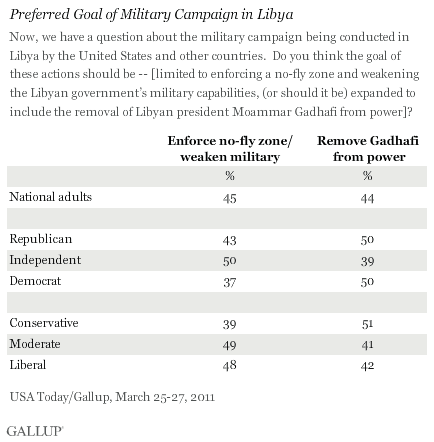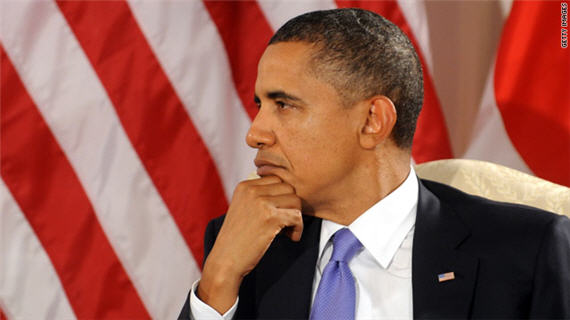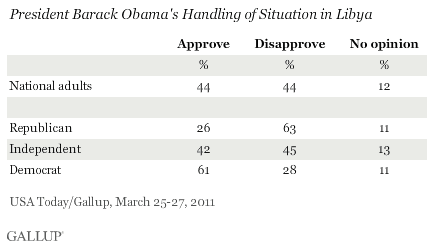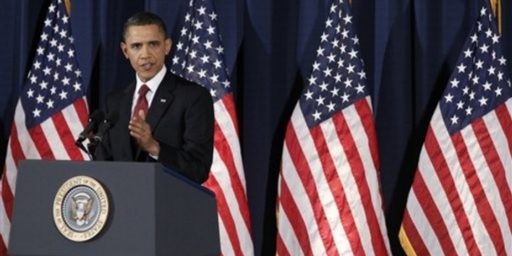Public Still Skeptical Of Libya Intervention
One week in to Operation Odyssey Down, public opinion is, to put it as nicely as possibly, ambivalent.
As I noted last week, the initial public response to President Obama’s decision to intervene in Libya was unique in that it lacked the “rally around the flag” effect that we typically see after the President decides to engage military force abroad. One week later, it’s pretty clear that initial skepticism remains:
After several days of airstrikes on Libya by the United States and its allies, the public has mixed reactions to the military operation. Nearly half of Americans (47%) say the United States made the right decision in conducting air strikes in Libya, while 36% say it was the wrong decision. Fully one-in-six (17%) express no opinion.
On balance, however, the public does not think that the U.S. and its allies have a clear goal in taking military action in Libya. Just 39% say the U.S. and its allies have a clear goal, while 50% say they do not.
(….)
Most Americans see a fairly lengthy involvement for the United States in the Libyan operation. Six-in-ten (60%) think the U.S. involvement in military action in Libya will last for some time; just 33% expect that it will be over pretty quickly.
Americans are about evenly divided over whether the aim of military action by the United States and its allies should be to remove Moammar Gadhafi from power or not: 46% say the goal of military action should include Gadhafi’s removal while 43% say the U.S. and its allies should focus only on protecting Libyan civilians from violence.
Notably, most people do not view the United States as the lead actor in the military operation. Fully 57% say that the United States “is just one of a coalition of countries” involved in the military mission; far fewer (35%) say the United States “is leading the military action.”
Additionally, a new Gallup poll shows that Americans are equally divided over whether or not they approve of the President’s handling of the Libya crisis:
While the American public is fairly ambivalent about what the goal of the mission in Libya should even be:
 Gallup concludes that President Obama’s decision to step back the U.S. role in the mission and avoid further intervention to topple Gaddafi are essentially in line with where the public is on this issue right now. They may be right, but the problem that Obama faces is that the decision to intervene has set events into motion that have taken on a life of their own. Is it really going to be possible for Obama, and the rest of the West, to essentially sit back and let the rebels be pushed back while Libya descends into a protracted war, for example? At that point, the President will be faced with choices that the public isn’t likely to approve of, and he’ll be in a precarious position to say the least.
Gallup concludes that President Obama’s decision to step back the U.S. role in the mission and avoid further intervention to topple Gaddafi are essentially in line with where the public is on this issue right now. They may be right, but the problem that Obama faces is that the decision to intervene has set events into motion that have taken on a life of their own. Is it really going to be possible for Obama, and the rest of the West, to essentially sit back and let the rebels be pushed back while Libya descends into a protracted war, for example? At that point, the President will be faced with choices that the public isn’t likely to approve of, and he’ll be in a precarious position to say the least.
As I noted last week, it’s rather extraordinary to see the public this ambivalent about a Presidential foreign policy decision, especially when it involves a nation that has been a thorn in America’s side for decades now. If they aren’t supporting the President now, what will they do if he comes back and says we need to do more?
One final note. Both of these polls were taken before President Obama’s speech last night. However, given the fact that the speech was, in a word, underwhelming, it seems doubtful that it did much to move public opinion on this issue. Not only is the President engaged in a unilateral war against a nation that poses no threat to us, he’s doing so without any real support from the public. How’s that likely to work out?







